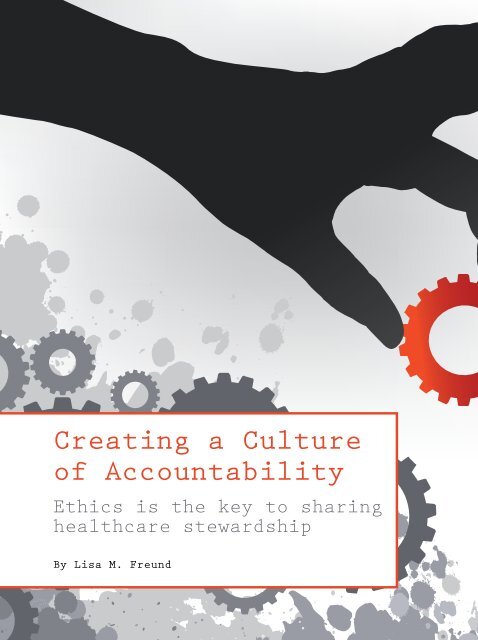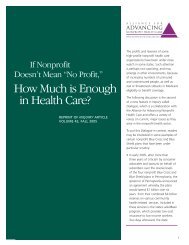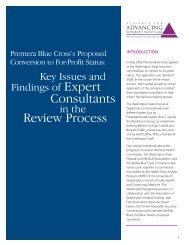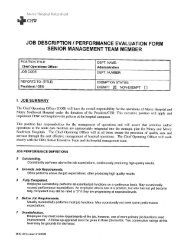"Creating a Culture of Accountability," by Lisa M. Freund - ACHE.org
"Creating a Culture of Accountability," by Lisa M. Freund - ACHE.org
"Creating a Culture of Accountability," by Lisa M. Freund - ACHE.org
You also want an ePaper? Increase the reach of your titles
YUMPU automatically turns print PDFs into web optimized ePapers that Google loves.
<strong>Creating</strong> a <strong>Culture</strong><br />
<strong>of</strong> <strong>Accountability</strong><br />
Ethics is the key to sharing<br />
healthcare stewardship<br />
By <strong>Lisa</strong> M. <strong>Freund</strong>
For many healthcare leaders ethics<br />
is a practical tool used to enhance<br />
decision making and shape <strong>org</strong>anizational<br />
practices and policies. Ethics<br />
also serves as a fundamental language for<br />
healthcare pr<strong>of</strong>essionals that creates a<br />
common purpose and shared<br />
accountability.<br />
The role and impact <strong>of</strong> ethics was the<br />
underlying theme as healthcare executives<br />
gathered for “The Ethics <strong>of</strong><br />
Healthcare Organizations as Stewards<br />
<strong>of</strong> Their Communities,” Aug. 5, 2009,<br />
in conjunction with <strong>ACHE</strong>’s New<br />
York Cluster.<br />
Led <strong>by</strong> Laurence B. McCullough, PhD,<br />
Dalton Tomlin Chair in Medical Ethics and<br />
Health Policy and associate director for<br />
Education, Center for Medical Ethics and<br />
Health Policy, Baylor College <strong>of</strong> Medicine,<br />
Houston, the program was funded in<br />
part <strong>by</strong> <strong>ACHE</strong>’s philanthropic initiative,<br />
the Fund for Innovation in<br />
Healthcare Leadership. (See<br />
Fund for Innovation in Healthcare<br />
Leadership on page 36.) Following<br />
McCullough’s presentation, attendees participated<br />
in small-group discussions, applying<br />
program concepts to ethical challenges<br />
they face. (See Apply the Co-fiduciary<br />
Concept in Your Organization on page 32.)<br />
Aligning Co-fiduciaries<br />
Clinical ethics and management ethics<br />
should be based on the concept <strong>of</strong> healthcare<br />
pr<strong>of</strong>essionals and healthcare <strong>org</strong>anizations<br />
as moral co-fiduciaries—essentially<br />
holding the trust—for a defined population<br />
<strong>of</strong> patients, McCullough says. In<br />
this regard, healthcare<br />
leaders should create<br />
a culture that protects<br />
and promotes<br />
the health-related
<strong>Creating</strong> a <strong>Culture</strong> <strong>of</strong> <strong>Accountability</strong><br />
Ethics is the key to sharing healthcare stewardship<br />
interests <strong>of</strong> the patient as the <strong>org</strong>anization’s<br />
primary concern and motivation.<br />
In addition, healthcare<br />
leaders must work to make other<br />
stakeholders—physicians, payors<br />
and government agencies—equal<br />
partners in protecting the interests<br />
<strong>of</strong> the patient population.<br />
To get others to think like healthcare<br />
co-fiduciaries, McCullough suggests<br />
first using the word “co-fiduciary” to<br />
make it understood in your <strong>org</strong>anization.<br />
Second, he says, ensure the <strong>org</strong>anization’s<br />
culture reflects the ethical<br />
value it places on the health-related<br />
interests <strong>of</strong> the patient: “You can’t<br />
assume that culture aligns with ethical<br />
values; you have to make sure it does.”<br />
An <strong>org</strong>anization’s policies and practices,<br />
allocation <strong>of</strong> resources and<br />
expectations for its leaders are indicators<br />
<strong>of</strong> its culture, McCullough<br />
says. Equally telling is what <strong>org</strong>anizational<br />
leaders encourage and<br />
reward, discourage and punish and<br />
what they tolerate.<br />
“When we think like co-fiduciaries,<br />
there are things essential to the mission<br />
that aren’t going to make<br />
money,” McCullough says.<br />
“In a hospital setting, all<br />
employees and medical<br />
staff members have a<br />
stewardship responsibility<br />
for the healthcare given to<br />
our patients and community.<br />
This co-fiduciary concept<br />
strengthens employee<br />
engagement and involves<br />
them in making daily decisions<br />
that are grounded in ethical<br />
behavior.”<br />
— Warren Lyons, F<strong>ACHE</strong>,<br />
Temple University<br />
Health System<br />
Apply the Co-fiduciary Concept in Your Organization<br />
Gather senior leaders in your <strong>org</strong>anization for the following exercise:<br />
1. Choose a central ethical problem to address (e.g., access to care,<br />
patient safety, transparency).<br />
2. Discuss how the concept <strong>of</strong> healthcare pr<strong>of</strong>essionals, healthcare<br />
<strong>org</strong>anizations and other stakeholders as moral co-fiduciaries<br />
for a defined population <strong>of</strong> patients applies to the<br />
problem you selected.<br />
3. Given the discussion, determine how to manage the<br />
problem.<br />
Leadership that is focused solely on<br />
the bottom line experiences a disconnect<br />
with these values, he adds.<br />
To gain buy-in from external stakeholders,<br />
McCullough says healthcare<br />
leaders must voice requests for their<br />
involvement and support in caring<br />
for a community <strong>of</strong> patients. For<br />
example, providers could call on<br />
insurers to include mental health coverage<br />
in their plans or partner with a<br />
competing hospital to provide a community<br />
clinic.<br />
Program attendee Warren Lyons,<br />
F<strong>ACHE</strong>, director, Operations<br />
Support, and CEO, Temple<br />
Transport Team, Temple University<br />
Health System, Philadelphia, attests<br />
to the relevance <strong>of</strong> co-fiduciaries.<br />
“In a hospital setting, all employees<br />
and medical staff members have a<br />
stewardship responsibility for the<br />
healthcare given to our patients and<br />
community,” Lyons says. “This c<strong>of</strong>iduciary<br />
concept strengthens<br />
employee engagement and involves<br />
them in making daily decisions that<br />
are grounded in ethical behavior. This<br />
concept also helps in dealing with<br />
healthcare providers and insurers who<br />
may think they are not involved in ethical-decision-making<br />
responsibilities.”<br />
Managing Resources<br />
Ethically<br />
McCullough says responsible healthcare<br />
resource management is a chief<br />
role for co-fiduciaries and charges<br />
32<br />
Reprinted from<br />
Healthcare Executive<br />
JAN/FEB 2010<br />
ache.<strong>org</strong>
<strong>Creating</strong> a <strong>Culture</strong> <strong>of</strong> <strong>Accountability</strong><br />
Ethics is the key to sharing healthcare stewardship<br />
healthcare executives with creating<br />
“an <strong>org</strong>anizational culture <strong>of</strong><br />
accountability for pr<strong>of</strong>essional integrity.”<br />
In such a culture, patient care<br />
is provided via the highest clinical<br />
and moral standards and is based<br />
on the principles <strong>of</strong> evidence-based<br />
medicine to reduce variation in<br />
healthcare delivery.<br />
Achieving quality in the patientcare<br />
process, there<strong>by</strong> incrementally<br />
improving outcomes, is the means<br />
to managing cost, McCullough<br />
says. “It took us 20 years to learn<br />
this; you have to directly manage<br />
quality” to control costs. He adds,<br />
in using evidenced-based medicine,<br />
“the healthiest patient at the end <strong>of</strong><br />
a quality process <strong>of</strong> care is also the<br />
least expensive patient.”<br />
McCullough says hospital leaders<br />
understand the costs <strong>of</strong> uncontrolled<br />
variation, but clinicians still need to<br />
be taught this: “They don’t want to<br />
be told how to practice medicine,<br />
but everyone has room for improvement.”<br />
Healthcare leaders should<br />
engage in comprehensive activities<br />
to improve quality and reduce<br />
uncontrolled variation and require<br />
everyone’s participation. In this discussion,<br />
McCullough explains,<br />
common ethical values provide the<br />
context to eliminate the us-versus-them<br />
Ethics in Practice<br />
Several attendees describe how they<br />
put the program’s concepts into<br />
practice and share their perceptions<br />
<strong>of</strong> the value <strong>of</strong> the ethics program.<br />
“Dr. McCullough’s<br />
presentation on<br />
the evolution <strong>of</strong><br />
the managed<br />
practice <strong>of</strong> medicine<br />
and the role<br />
<strong>of</strong> the physician<br />
Brown and the healthcare<br />
executive in their<br />
stewardship <strong>of</strong> these resources hit<br />
home for me, and I’ve shared the<br />
highlights with colleagues. Larry<br />
provided an excellent summary <strong>of</strong><br />
the issues, and it helped to enlighten<br />
much <strong>of</strong> the discussion around<br />
healthcare reform that continues in<br />
the House and Senate to this day. It<br />
reinforced the need for healthcare<br />
executives to work closely with physicians<br />
and the community at large<br />
to deal with the tough questions <strong>of</strong><br />
access and limited resources that<br />
we face in some shape or form<br />
almost daily.”<br />
MaryAnn Brown, F<strong>ACHE</strong><br />
Senior Director and Team Leader—<br />
Clinical Improvement Services<br />
VHA Empire—Metro<br />
White Plains, N.Y.<br />
“I am the administrator<br />
for our chemical<br />
dependency<br />
program, which is a<br />
unique hospitalbased<br />
service for an<br />
underserved population.<br />
Keeping in<br />
Fiore-Lopez<br />
mind the co-fiduciary<br />
concepts that were presented <strong>by</strong><br />
Dr. McCullough enables me to address<br />
the multiple stakeholders whose needs<br />
must be met in order to effectively manage<br />
these patients. These concepts also<br />
improve my ability to address the interdisciplinary<br />
nature <strong>of</strong> inpatient rehabilitation.<br />
Nursing is the largest stakeholder<br />
in the inpatient setting, and I believe as a<br />
nurse executive I am uniquely situated to<br />
use the co-fiduciary concepts to move<br />
the interdisciplinary<br />
team forward in the<br />
inpatient setting.”<br />
Nicolette Fiore-<br />
Lopez, RN<br />
Chief Nursing Officer<br />
St. Charles Hospital<br />
Port Jefferson, N.Y.<br />
“Scarce resources,<br />
access to care disparities<br />
and life<br />
sciences advances<br />
are presenting<br />
constant and<br />
evolving challenges<br />
for health-<br />
Lyons<br />
care providers.<br />
The <strong>ACHE</strong> ethics program series<br />
gives us an opportunity to reset our<br />
personal moral compass and the ethical<br />
guidelines for our <strong>org</strong>anizations.”<br />
Warren Lyons, F<strong>ACHE</strong><br />
Director, Operations Support<br />
CEO, Temple Transport Team<br />
Temple University Health System<br />
Philadelphia<br />
34<br />
Reprinted from<br />
Healthcare Executive<br />
JAN/FEB 2010<br />
ache.<strong>org</strong>
<strong>Creating</strong> a <strong>Culture</strong> <strong>of</strong> <strong>Accountability</strong><br />
Ethics is the key to sharing healthcare stewardship<br />
mentality and serve as a bridge to reach<br />
shared patient goals.<br />
Fund for Innovation in<br />
Healthcare Leadership<br />
“The Ethics <strong>of</strong> Healthcare<br />
Organizations as Stewards <strong>of</strong><br />
Their Communities” was funded<br />
in part <strong>by</strong> the Foundation <strong>of</strong> the<br />
American College <strong>of</strong> Healthcare<br />
Executives’ philanthropic initiative,<br />
the Fund for Innovation in<br />
Healthcare Leadership.<br />
Healthcare management ethics was<br />
identified <strong>by</strong> the Fund as a key area<br />
<strong>of</strong> focus. In this regard, the Fund<br />
supports <strong>ACHE</strong>’s long-standing<br />
commitment to promoting the<br />
highest standards <strong>of</strong> ethical conduct<br />
in the field. A second program<br />
supported <strong>by</strong> the Fund in<br />
2009, “Applying Social Media in<br />
Healthcare,” was <strong>of</strong>fered in<br />
November in San Antonio. (Look<br />
for an article on social media in<br />
healthcare in the May/June issue <strong>of</strong><br />
Healthcare Executive.)<br />
The Fund was established in 2006<br />
to bring innovation to the forefront<br />
<strong>of</strong> healthcare leadership. In<br />
Responsible resource management also<br />
requires healthcare leaders to address<br />
<strong>org</strong>anizational conflicts <strong>of</strong> interest,<br />
McCullough says. He urges leaders to<br />
identify conflicts <strong>of</strong> interest in payment<br />
plans and contracts they are negotiating<br />
with payors. Economic incentives<br />
should be tied to quality, and healthcare<br />
<strong>org</strong>anizations and healthcare pr<strong>of</strong>essionals<br />
should be held accountable.<br />
Finally, educating patients and the<br />
public about how conflicts <strong>of</strong> interest<br />
are addressed in managing healthcare<br />
resources also is crucial in preventing<br />
ethical conflicts, says McCullough.<br />
Going forward, patient autonomy will<br />
be restricted in order to achieve quality<br />
and control costs. Providers must<br />
its commitment to developing<br />
future leaders, the Fund also has<br />
provided scholarships for <strong>ACHE</strong>’s<br />
Executive Programs.<br />
Since the Fund’s inception, more<br />
than 700 generous donors have<br />
made contributions. This support<br />
has enabled the Fund to strengthen<br />
the field <strong>of</strong> healthcare leadership <strong>by</strong><br />
providing educational opportunities<br />
on important trends and issues.<br />
For more information on the Fund,<br />
including ways to contribute, please<br />
visit ache.<strong>org</strong>/Innovation or contact<br />
Laura Wilkinson, assistant<br />
director, Development, at (312)<br />
424-9305 or lwilkinson@ache.<strong>org</strong>.<br />
assure patients that one standard <strong>of</strong><br />
care exists and that they will get the<br />
care they need, he adds.<br />
“Ethical conflicts take a toll on<br />
patients, communities and healthcare<br />
providers,” McCullough says. When<br />
healthcare leaders face an ethical challenge,<br />
McCullough urges them to<br />
think the issue through, gather all the<br />
facts, determine the obligations <strong>of</strong> providers<br />
and other stakeholders, and follow<br />
through to a reasoned conclusion.<br />
Acknowledging the impact <strong>of</strong> ethics,<br />
Lyons says, “There is a science and<br />
methodology for resolving ethical issues<br />
that should be learned and used in a formal<br />
way. This approach is no different<br />
or less rigorous than clinical differential<br />
diagnosis or audits <strong>of</strong> financial records.”<br />
<strong>Lisa</strong> M. <strong>Freund</strong> is editor-in-chief <strong>of</strong><br />
Healthcare Executive.<br />
Notes:<br />
More information on the co-fiduciary<br />
concept can be found in “Physicians and<br />
Hospital Managers as C<strong>of</strong>iduciaries <strong>of</strong><br />
Patients: Rhetoric or Reality” <strong>by</strong> Frank<br />
A. Chervenak and Laurence B.<br />
McCullough, in the May/June 2003<br />
issue <strong>of</strong> the Journal <strong>of</strong> Healthcare<br />
Management, Vol. 48, No. 3.<br />
<strong>ACHE</strong>’s next ethics program, funded<br />
in part <strong>by</strong> the Fund for Innovation in<br />
Healthcare Leadership, will be Oct.<br />
6, 2010, during the San Francisco<br />
Cluster. Visit ache.<strong>org</strong>/Seminars for<br />
more information.<br />
36<br />
Reprinted from<br />
Healthcare Executive<br />
JAN/FEB 2010<br />
ache.<strong>org</strong>







